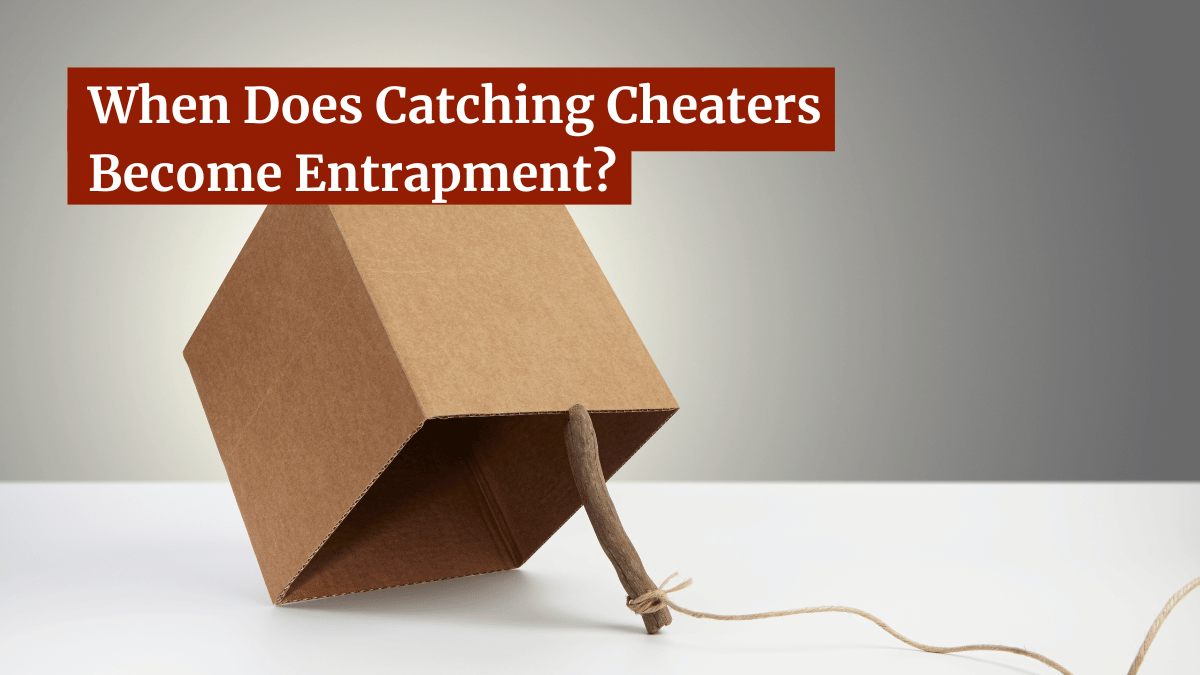Did a Professor Entrap His Students?

Recently, Garret Merriam, an associate professor of philosophy at Sacramento State University, was searching on Google to see if questions from his exams were available on the site.
He found a copy of one of his previous final exams on the “study aid” website Quizlet, which is routinely used by students to share answers for tests. He contacted the website and got the test answers removed.
However, it was then he made a decision that has proved to be somewhat divisive. He created an account on Quizlet and then uploaded another answer sheet, this one with all incorrect answers.
According to Merriam, the answers were obviously wrong and should have been immediately obvious to anyone who paid any attention in the course. He went on to say that he would only consider a student a cheater if there was less than 1 in 100 odds that the answers were picked at random. This meant students needed to copy some 19 out of the 70–80 questions to be flagged as cheating.
However, even with that, he claims that he caught 40 of his 96 students cheating on the take-home exam. He further reported that ⅔ of those students, when confronted, confessed either right away or very quickly. Though others are protesting their innocence, all but one case, which he says is “on the bubble”, are pretty clear-cut, with odds approaching 1 in a billion.
But, despite the strong evidence of attempted cheating, at least some of the criticism has been directed at Merriam himself, with some saying that he was being equally as dishonest as the students and even that he was engaging in “entrapment.”
So, he took to the internet to get outside opinions on this matter. First, posting Twitter about the story:
I caught 40 (out of 96) of my Intro to Ethics students cheating on the final.
— Are you a cop? You gotta tell me if you're a cop. (@SisyphusRedemed) May 22, 2023
I hate being a cop. That's not why I got into this line of work.
And then to the site Daily Nous, a news site about the philosophy profession.
Everywhere he’s shared the story, he’s received comments that are both supportive and critical of his actions. But, while I agree that this is a complicated issue with plenty of nuance, I ultimately side with Merriam.
To understand why, we have to first look at the arguments against him.
The Arguments Against Merriam
The main arguments against Merriam come from the simple truth that he had other options for how he handled the situation. In particular, he could have either:
- Removed the answer key and not replaced it.
- Removed the answer key and replaced it (or made major changes to the exam), but not report the students who used it for cheating. Instead, letting them fail the test organically.
Both approaches would have prevented successful cheating on the test, and neither would have resulted in disciplinary action against the students (other than failing the test). In short, many want to maximize the integrity of the test, while minimizing the repercussions that students face.
Some go a bit beyond that and claim that what Merriam did was dishonest. After all, he uploaded a document that claimed to be the answers to the test, when in truth it was nothing but obviously false answers.
With that in mind, it’s easy to see why some, in particular some close to the case, feel as if Merriam lied in order to catch and punish students for cheating, missing opportunities to deescalate the issue along the way.
However, that’s not entirely fair to Merriam, and it doesn’t acknowledge the realities teachers face in the classroom.
Why it Was the Right Thing to Do
Right off the bat, any arguments that Merriam engaged in “entrapment” are off the mark. While he uploaded a fake answer key, he didn’t push or cajole students to seek it out.
Students who weren’t attempting to cheat had no reason to search for or seek this key out. Though some students do use site’s like Quizlet for studying, the main use for those sites is cheating and, any honest students using them for legitimate purposes, should have known to avoid those guides.
In short, the presence of the guide almost certainly didn’t coax anyone into cheating who wasn’t already looking to do it.
But then the question becomes about deescalating and minimizing the harm to the students. With that, there’s a simple question: Is attempted cheating (unsuccessful cheating) still a breach of academic integrity?
If it is, Merriam had a responsibility to report the cases. As we’ve seen before, many instructors either ignore or deal with cases of plagiarism and other academic integrity issues in class, not reporting them to the school.
This has a triple effect. First, it makes it possible for repeat cheaters to skate by with minimal consequences. Second, it also prevents students, many of whom have a genuine need for help, from getting the assistance they need. Finally, it prevents the school from knowing just how serious their integrity issues are, making it impossible to take steps to address it.
While I understand that we live in an imperfect world where schools often focus more on punishing integrity issues than collecting good data or helping students who are in trouble, a good academic integrity system should be focused on those things first and foremost. Punishment, while necessary, should not be the primary goal.
As for the allegations of dishonesty, that, appropriately, delves into the realm of philosophy. When and if dishonesty is acceptable is one of the more complicated issues.
However, I do have one question: Did the students have a reasonable expectation that the work was legitimate? Quizlet, in its terms of service, makes it clear that they offer no warranties on the content of the site, including its “fitness for a particular purpose.”
The only reason that students expected it would work is that it had worked in the past. They are still looking at a work uploaded by an unknown author, on a site that warns them that the content may not be accurate, and then trusting it.
To that end, poisoning the well, as the expression goes, may be a way to limit the efficacy of these sites for cheating. If students can’t tell which answers are legitimate, they will either have to find another way to cheat or take the exam honestly.
So, while it may be a deception, it’s a minor deception at worst. Not only was he working to counter a more direct deception by his students, but he did so in an environment where students should have no reason to trust what they see.
Bottom Line
In the end, I find no personal issue with how Merriam handled the situation. Yes, there was deception involved, but focusing on that is an attempt to deflect from the deception that the students were actively trying to pull.
While I would prefer that he warned the students he may do this, he didn’t really have a chance with this particular exam. Hopefully, if he does this again, his students will be on alert.
However, one area I do side with his critics is when it comes to approaches to prevent cheating. Rather than focusing efforts on detecting cheating, looking at ways to prevent it or make it difficult/impossible are, in general, a better use of time and resources.
This includes crafting assignments that resist cheating, requiring students to show more of their work and, yes, Googling your questions to see if they are easily answered elsewhere.
It’s likely that a few changes to this assignment would have made cheating on it much more difficult. While that certainly wouldn’t have discouraged all the students who did try to cheat, it might have discouraged most.
While detection is important when it comes to academic integrity, it can’t be the only strategy. As such, my fear from this story isn’t necessarily that instructors will poison the well on cheating sites and “entrap” more cheaters, but that it is all that they will do.
Want to Reuse or Republish this Content?
If you want to feature this article in your site, classroom or elsewhere, just let us know! We usually grant permission within 24 hours.
